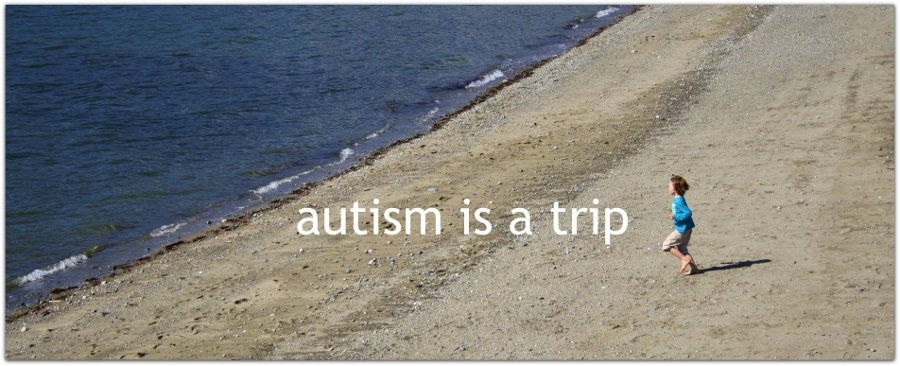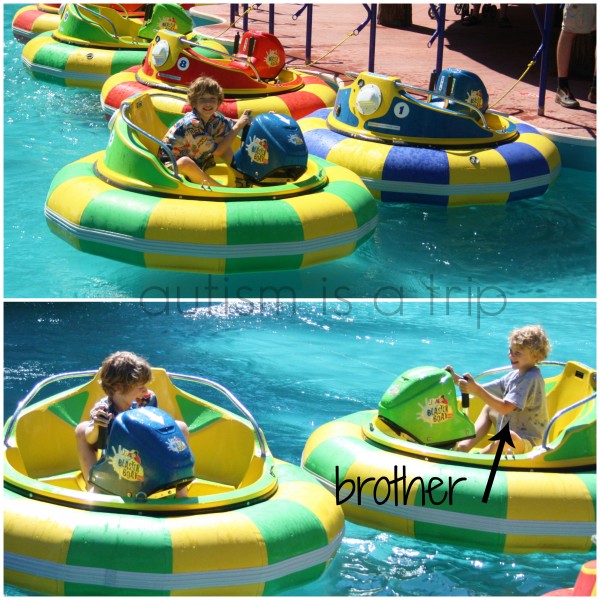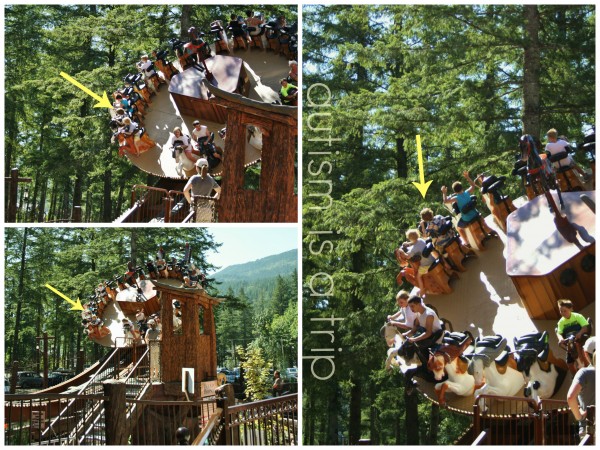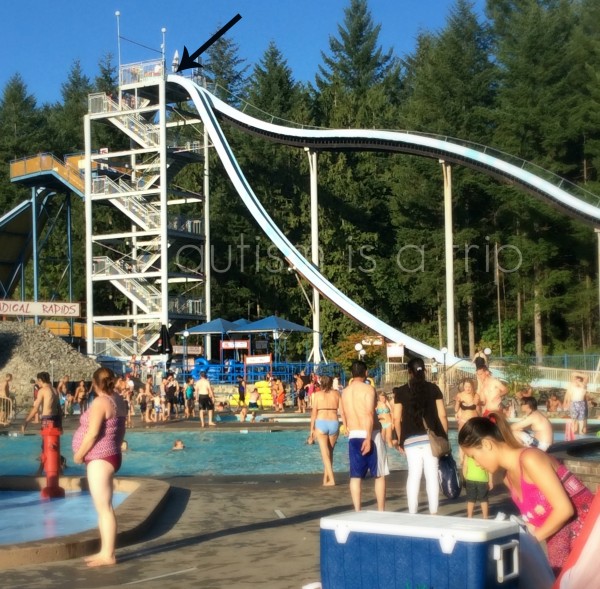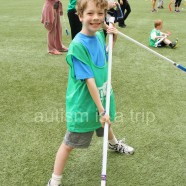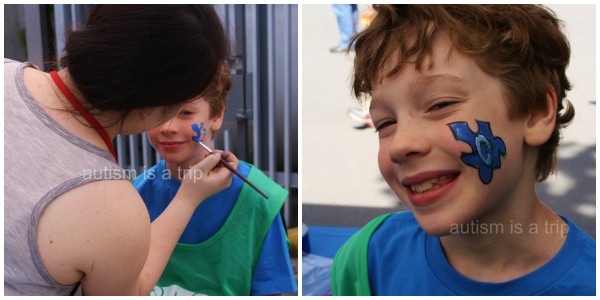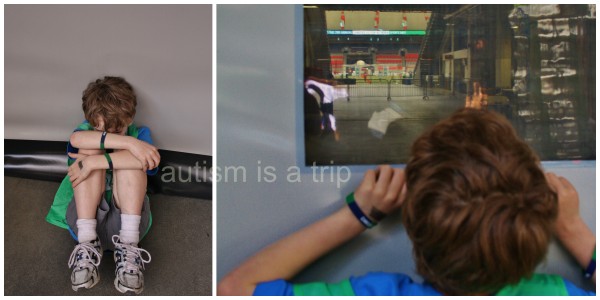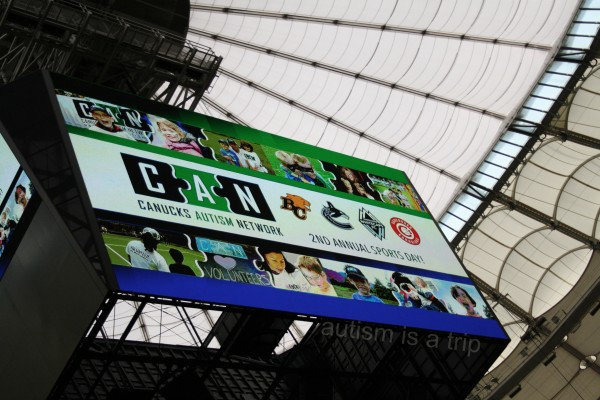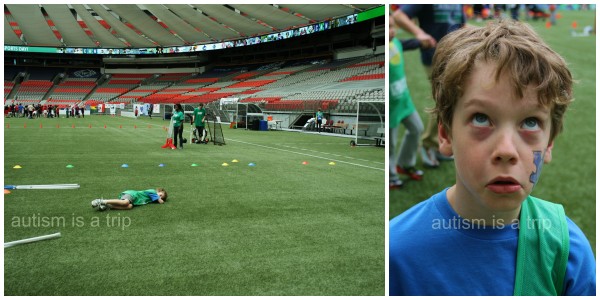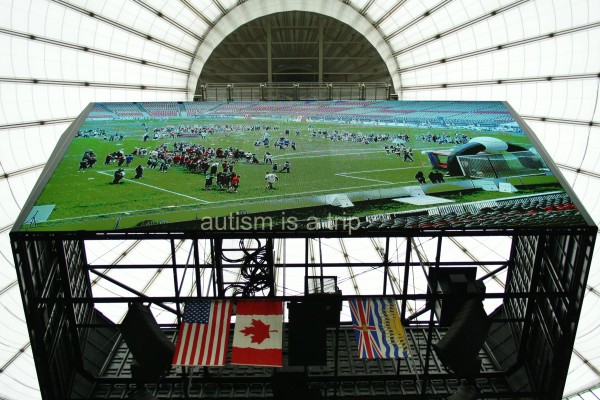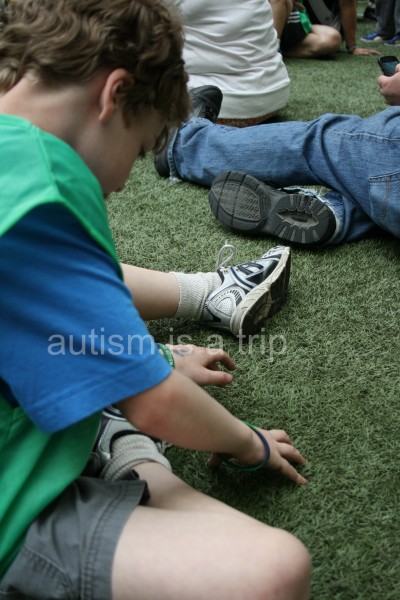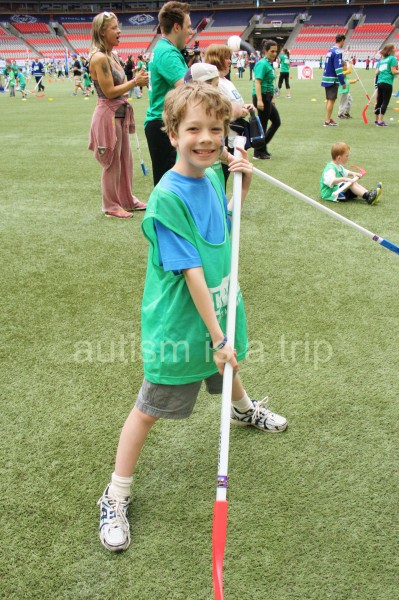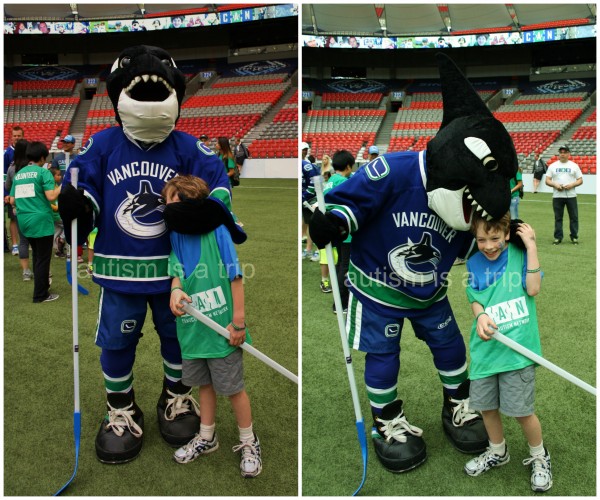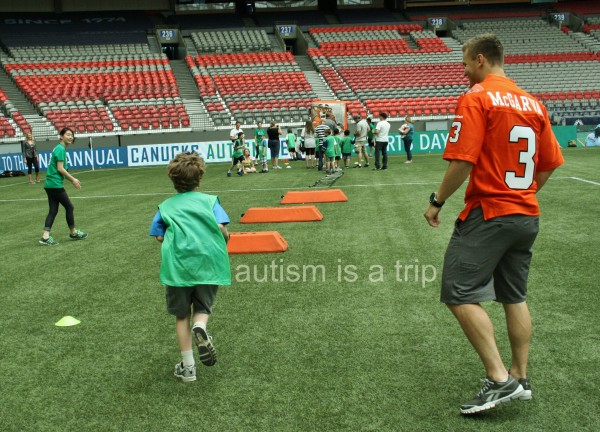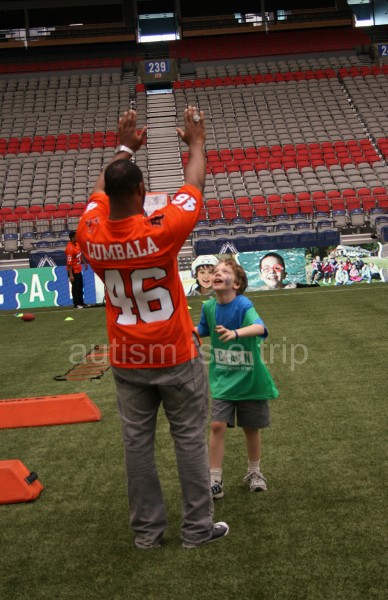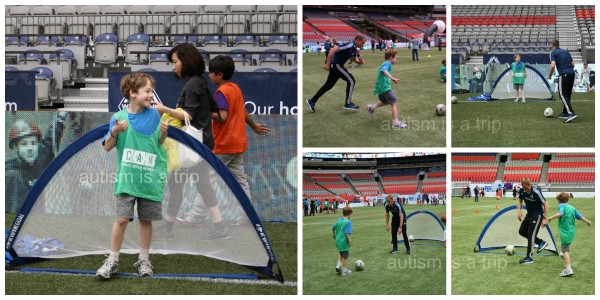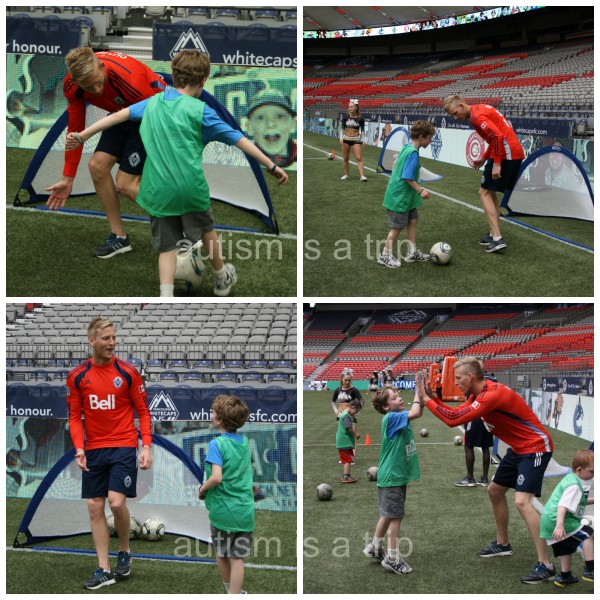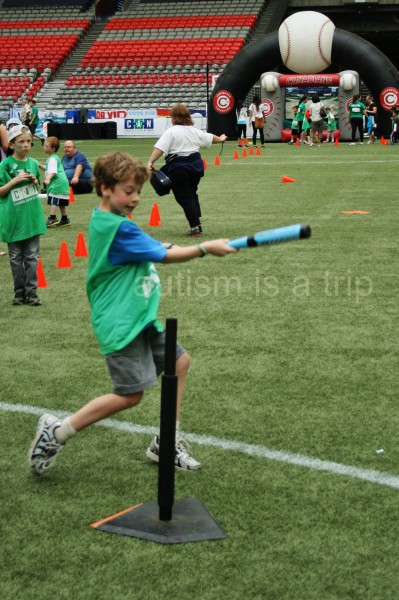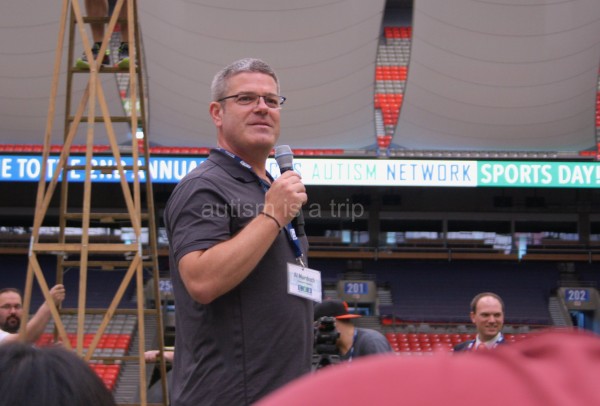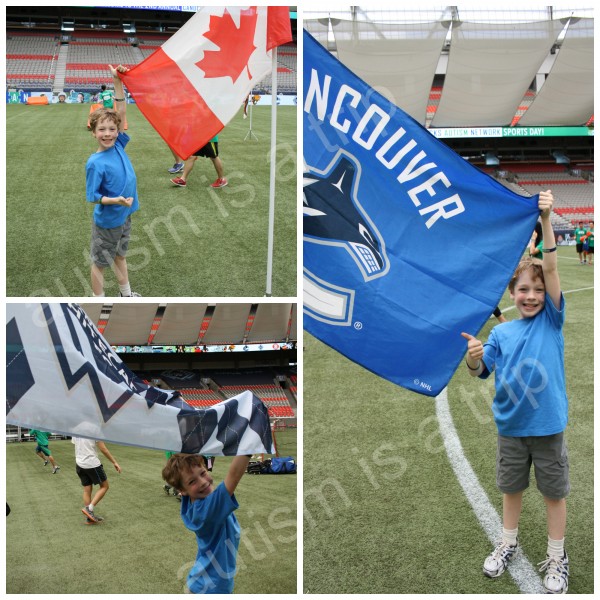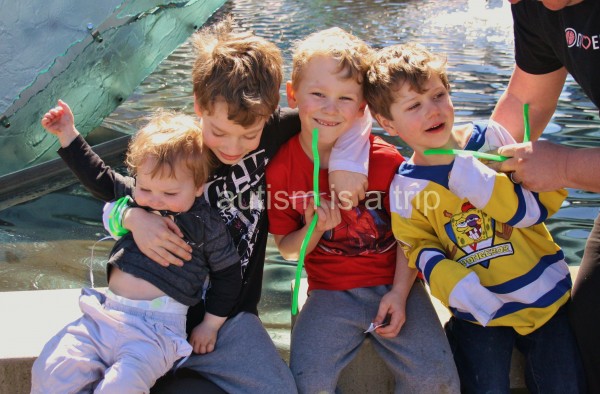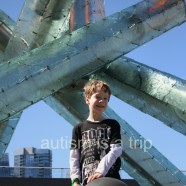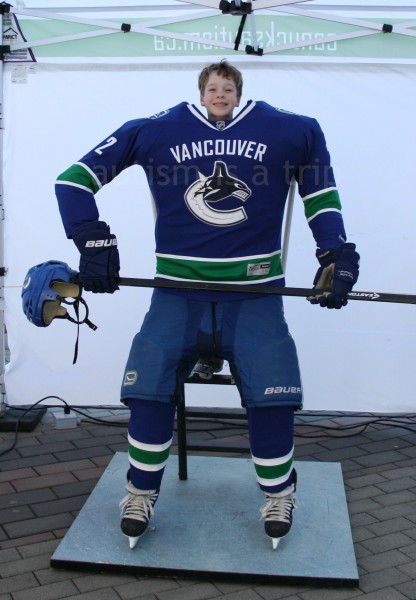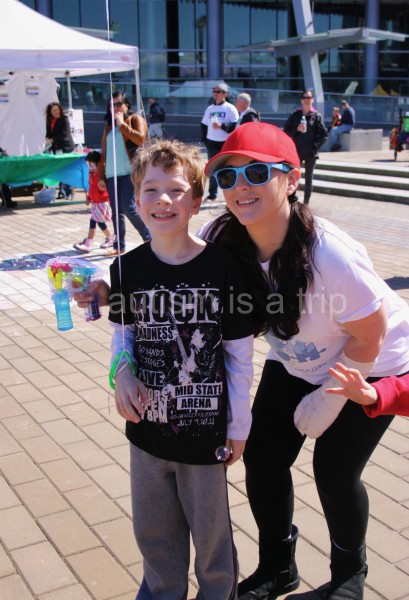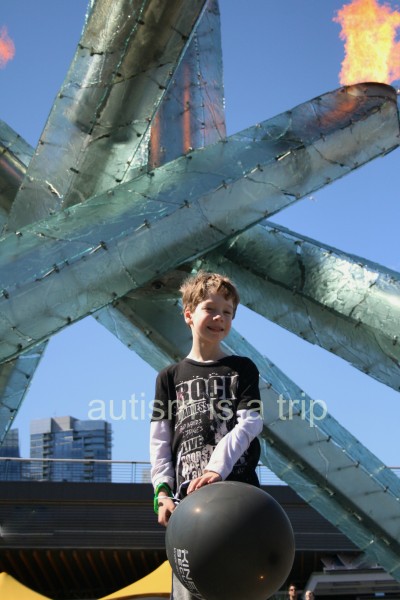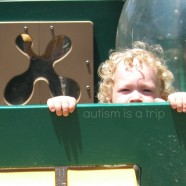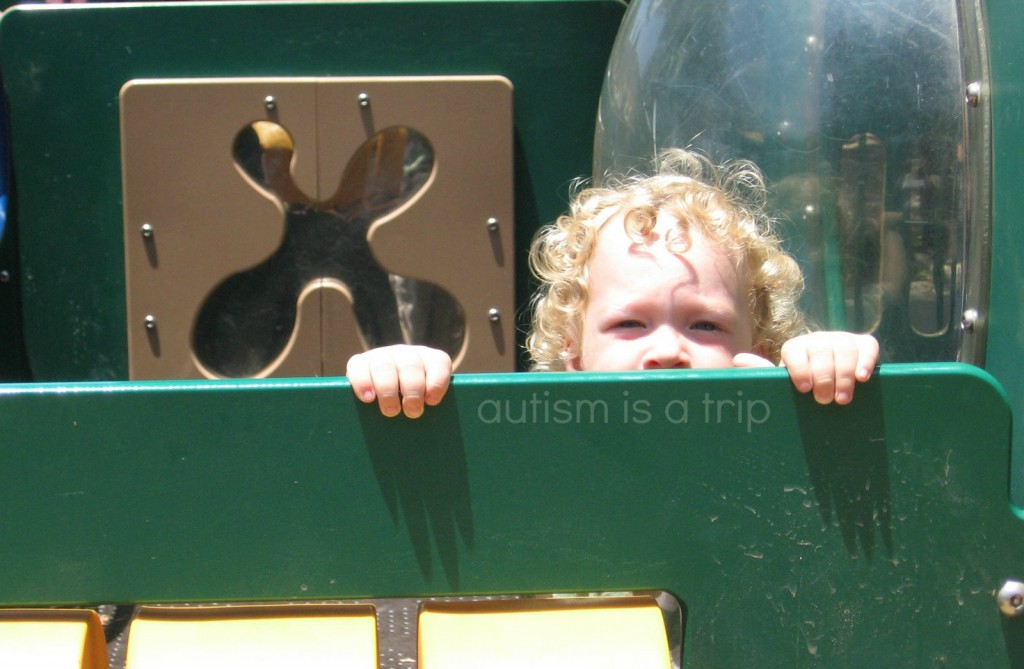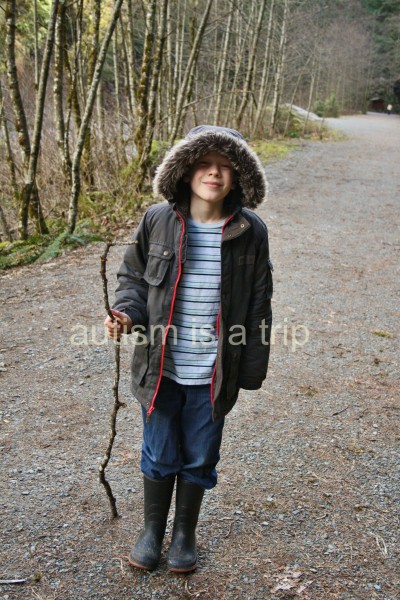Facing Our Fears
I’ve been away for a bit. I’ve been in a self-made cocoon of sorts, waiting for the right time to reveal my “new” self.
Or the self I’ve always been, but didn’t really know it.
Anyway, I’ve been thinking on the best way to start the conversation here. This place that I’ve built to laugh and cry, and bemoan, and celebrate autism in our family. This place that has become a safe haven for me and others, a place where it’s OK to be our true selves, autism, warts, and all.
I thought for a while that I needed to bring platitudes and great revelations. That I needed to be profound.
And as I sat, cozy and safe in my self-imposed little box, it came to me.
Rather, Jack came to me.
Jack has been my teacher on so many levels, and I should have known this would be no different.
A couple of weeks ago, we went to a small amusement park and a big water slide park on the same day. We don’t do amusement parks, as a rule, for a few different reasons: Money, crowds, autism, crowds, crazy children, lines, money, and, of course, crowds. The kids have been on a few rides here and there (most recently the Great Wheel in Seattle), but we haven’t done a full-fledged amusement park since Disneyland years ago when the kids were small.
The only water slides my kids have encountered have been the small ones at a downtown spray park, and the slide at our local pool (not small by any means, but not theme-park-sized).
I was worried how Jack would do on the rides, since he really seemed to hate them when he was younger. I also didn’t know how he would react to the water-slides, as you can’t exactly avoid being splashed in the face or dunked underwater.
To our relief, the amusement park was both quite small and fairly empty. The kids didn’t have to wait in line for anything. It was like an Autism Miracle.
He handled it all. Really well. By himself.
For instance, he did this:
He both shot his brother in the face, and took many hits in return. All with a big grin.
This one amazed me. Jack HATED swings as a baby and small child. It took about two full years of occupational therapy to get him to not only ride a swing, but enjoy it. Now he’s a swinging fool.
He did this:
This ride made my husband ill just looking at it. They’re up there spinning around, while spinning around. Like teacups up in the air.
And then he did this:
If you can’t tell from the photos, this little ride here is like a carousel on acid. You sit on a horse, and the platform starts to rotate. Then, the whole thing rises up one side of an arc, then down and up the other side. All while the platform is still rotating. Like someone thought the pirate ship that goes back and forth is a little too tame, and the carousel is just not dangerous enough.
So yeah, he rode that thing. Smiling.
We headed to the water slides, and Jack took off alone. I was worried about him, but figured he’d end up entertaining himself in the splash areas or pools.
Toward the end of our visit, my child ran up to me, dripping wet.
He had done this:
FIVE TIMES.
He was so excited to tell me. “Mom! I really conquered my fears today!”
And then he ran off to do it again.
I realize now that I haven’t been hiding in contemplation so much as in fear. I’ve been afraid. This post changes everything for me, but it’s time. If my child, who has come so very far in his almost-nine years of life, can stand up to his own fears and break through to the brighter side, so can I. And I will, for him.
This is my vertical drop.
So, here goes.
My name is Wendy, and I have Asperger’s.
I am autistic.
And I am happy.
Share this: Twitter | StumbleUpon | Facebook | digg | reddit | eMail Read More
Canucks Autism Network Sports Day Adventure!
As much as I complain about the state of autism support here in the Lower Mainland, we also have some pretty cool things going on. There are several societies that provide access to camps, supports, and many other activities for autistic individuals.
One group here doing it really right is the Canucks Autism Network (CAN). They help keep autistic kids involved in sports and a lot of other social events. CAN usually tries to involve siblings as well, to help foster a whole family experience. We absolutely love them.
Jack and I were very excited to attend the CAN 2nd Annual Sports Day on May 18th at BC Place. It was a day of serious fun with representatives from the Vancouver Canucks, the Vancouver Whitecaps FC, the BC Lions, and the Vancouver Canadians. I could tell you all about it, but I’d rather show you. Enjoy!
We arrived a bit early, so it was a good hour before the event started. CAN had set up face painting and colouring, but the waiting still got old after a bit. Anticipation and autism don’t mix well. The CAN volunteers are seasoned, though, and did their very best to keep everyone intact.
As everyone was introduced, we got a cool view of everything from above.
The kids were divided into four groups, and each group spent twenty-five minutes with an activity, then rotated to the next one. Jack’s group had hockey first!
There were photographers and cameras capturing it all, and showing everyone on the jumbotron. Jack noticed it quickly, and played right to the camera. That’s my boy.
Fin, the Canucks mascot, had a great time with the kids. He has a thing about chewing on their heads, though. They should keep an eye on that.
Next up was football, and Jack learned how to run the ball, throw the ball, and do a wicked touchdown dance.
We moved on to soccer, and Jack put the Whitecaps guys through their paces. A lot of the other kids were ready for a break, but Jack kept on going. And going. And going.
Finally, we moved over to baseball. After some pointers from Mama, Jack smacked a few line drives.
Canucks announcer Ed Murdoch closed out the event.
We had a lot of fun. Thank you CAN, for everything you do!
*************************************************************************8
Click HERE if you’re interested in joining CAN.
Click HERE if you’d like to be a CAN volunteer.
Click HERE for information on how to donate to and fundraise for CAN.
Share this: Twitter | StumbleUpon | Facebook | digg | reddit | eMail Read More
Mothering Autism
I don’t want a lot on Mother’s Day. I really don’t. I worked in restaurants for years (and my husband still does), so the last thing I’m interested in is taking all of my children out with the rest of humanity to battle for overpriced prime rib. We can do that anytime.
I also don’t feel the need to do anything “special,” since we do special things a lot. We have “Family Adventure Days” frequently, where we go adventuring. We explore the natural world around us, visit new museums, and just play as a family. So, Mother’s Day doesn’t require adventure.
What I want most on Mother’s Day is serenity.
At least, as much as I’m able, since my husband usually has to go to work. He’s a restaurant manager, and the rest of humanity still wants that prime rib.
This year, I requested that for the morning and early afternoon (before he leaves), to be left to my garden. I am still trying to finish my beds, and would like some uninterrupted time alone with the backyard.
I also asked for my children to help clean up the living room and kitchen. You know, where all of their toys are strewn.
That particular request was met with an uproar heard across the land. Two of my children decided they would rather not observe Mother’s Day at all, if it meant they actually had to pick up after themselves.
Jack took issue as well, in typical Jack fashion. He made the case as to why I was completely out of line by merely suggesting I make him do anything. On a weekend.
“I like to live my (weekend) days naturally, you can’t make me do a lot of action.”
OK. Apparently, any structured activity that’s not his idea is totally out of the question. He also insinuated that I’m trying to affect his brain.
By asking him to clean.
“You can’t keep this thing (his brain) up forever, that’s bad parenting, Mama.”
It took everything I had to keep a straight face.
I don’t want to be accused of being a bad parent, on Mother’s Day of all days. I’m making my husband do it. Father’s Day isn’t for another month, he’ll be fine.
Happy Mother’s Day!
Share this: Twitter | StumbleUpon | Facebook | digg | reddit | eMail Read MoreCanucks Autism Network Family Festival 2014
We always have a good time at the Canucks Autism Network‘s (CAN) Family Festival in downtown Vancouver. We usually go later in the day, so we miss the actual walk (we don’t like to do big crowds, even for autism – because of autism). We still enjoy the booths and activities, though.
Come join us next year!
Share this: Twitter | StumbleUpon | Facebook | digg | reddit | eMail Read MoreAutism in British Columbia: Crisis in Process
My son Jack was born in the United States and raised in Los Angeles until the age of four and a half. Just before he turned two, he entered the California Early Start program for children with a risk of developmental delay or disability. We called for an appointment in August of 2o06, and by the end of September of the same year, he was enrolled in a variety of interventions and therapies.
At age three, he was formally assessed and diagnosed with autism by both the Lanterman Regional Center and the Los Angeles Unified School District (LAUSD). He was transferred to autism-specific supports, where he remained until we moved.
From the time Jack was twenty-two months until he was four and a half, Jack received the following interventions and therapies:
AGE TWO
- Collaborative preschool with typical peers in a clinic-based classroom, three-to-four days a week
- Two hours a week of clinic-based Occupational Therapy
- Two hours a week of home-based Speech Therapy
- Several sessions of Feeding Therapy
- He was also offered full-time preschool, additional Occupational Therapy, Floortime Therapy, and Respite Care, which we did not feel were necessary at the time.
AGE THREE to FOUR
Provided by LAUSD:
- Individualized Education Program (IEP) support
- Collaborative preschool with typical peers in a public school classroom, five days a week
- Full-time Behavioural Intervention Implementation (BII) aide at school
- Two half-hours a week of school-based Speech Therapy
- Two half-hours a week of school-based Occupational Therapy
Provided by Lanterman Regional Centre:
- One hour a week of clinic-based Occupational Therapy
- Twelve hours a week of home-based Applied Behaviour Analysis (ABA)
- Respite Care
- Parent training workshops
We also supplemented his therapies at home, with strategies learned from his providers.
Several of the supports at school and at home were coordinated through the same non-profit organization, so there was continuity in both areas. We felt very confident that our son was receiving every support he needed, and that should he need more, the options were available to us.
We were given choices of providers and schedules, and the ability to change supports and therapies as we saw fit, but we were guided through the process by a social worker at Lanterman (Early Start), and then a caseworker at Lanterman, a support worker at LAUSD, and a coordinator at the non-profit who provided our BII and ABA aides.
It is important to note a couple of things. First, we never saw a bill. Not once. My husband and I signed authorization forms, reports, and time cards, but we were never financially responsible for anything.
Secondly, we were given suggestions and options as to what Jack needed, according to several observations and reports. We were able to give our input, but we were not responsible for creating his treatment plans. We never felt like the burden of figuring out what he required was on us.
Finally, we never saw a pediatrician or medical doctor (other than the diagnosing psychiatrists) for Jack’s autism. In fact, it came as a bit of a surprise to his pediatricians when we told them about his diagnosis. Jack has never had any of the health issues commonly associated with autism, and as it is not required in California, we had no reason to include his doctors in the diagnosing process.
When our family moved to Canada, Jack was in the process of transitioning from preschool to Kindergarten. In Los Angeles, he would have had full-time BII support, and continued with both speech therapy and home-based ABA (he had graduated from clinic-based occupational therapy) for as long as necessary.
I cannot speak to how his support would have waxed or waned over the school years, but I have only good things to say about our experiences up to that point.
I can, however, tell you what happens here in British Columbia.
Once we were settled, we were required to get Jack a new autism diagnosis from a Canadian doctor in order to qualify for provincial autism funding. Government funding is Canada’s answer to autism support, similar to the Regional Center system in California.
First, we had to see a pediatrician, and convince him Jack needed a referral for diagnosis. I was honestly shocked when he balked at giving it to us, even though Jack had already been formally diagnosed in the United States. Twice. The doctor wanted to rule out ADHD (which, it turns out, Jack does have), and Fragile X Syndrome (which he does not), before he would even consider referral. I pushed, though, and he relented.
Next came The Wait. We were told the wait time for assessment would be almost two years, and indeed it was fourteen months before he was seen.
Fourteen months is forever in the life of an autistic child and their family.
It can also be the difference between full- and no-support.
Children assessed with a spectrum disorder in BC under the age of six receive $22,000 a year of funding to pay for their various supports. The family is responsible for deciding which therapies and interventions are necessary, and all of the hows and whens and whos of making them happen. I know how overwhelmed we were in Los Angeles, and we had several agencies overseeing and coordinating everything for us.
Many families in BC are lost and confused as to what is necessary and when, and who to trust to give them good advice. They are expected to become autism experts overnight, and to know what their child needs at any given time.
Once a child on the spectrum reaches age six, the yearly funding drops to a mere $6,000. To cover every single thing the child or young adult needs.
$6,000 doesn’t go very far, in case you’re wondering.
Now consider the child who has been waitlisted until they are six or seven, eight, or older. Those children don’t get retroactive funding; they’re given the same $6,000 every other child over six gets.
$6,000 to sink or swim.
My husband and I often wonder where Jack would be in his development if he hadn’t had such intensive interventions and instead had to wait years to be seen. The difference between the two months it took in Los Angeles and the fourteen months it took in British Columbia is monumental.
It’s a lifetime.
In the first fourteen months of Jack’s therapies, he learned to use his upper body. He learned how to play.
He learned how to talk.
I cannot stress enough how important the first year of Jack’s interventions was in shaping the person he is today. That time was invaluable to him, and to us.
I have met many families of autistic individuals here in BC and have heard a lot of stories. Some wonderful, many concerning. Some downright terrible.
In the Lower Mainland, where we live, there is only one team that assesses and diagnoses autism. One team for a large and rapidly growing population – the fastest growing region in Canada.
Wait times to be seen are so outrageous, families who are financially able resort to paying for their own assessments out of pocket. Even those clinics now have tremendous wait times.
Yes, there are legitimate circumstances where a child may be older before he or she is diagnosed, but for families seeking help for younger children, the situation here can be bleak.
I cannot imagine where Jack would be today without the solid start he got at a very young age.
I cannot imagine the kind of support he would have gotten if we had to decide his plan of action alone, without professional guidance.
I cannot imagine the outcome if we had had serious budget restraints, or had to turn down therapies because we simply could not afford them.
Autistic children in Alberta get up to $60,000 a year for supports through age 18. Why should children in British Columbia not get the same?
Why do children over the age of six get so much less than younger children? Is autism less severe over the age of six?
Why are families left to fend for themselves in a province so well known for caring for its citizens?
It breaks my heart to see even one child go without the therapy and intervention he or she desperately needs. I don’t understand how a province can willingly stifle the potential of certain individuals because of their age or where they live.
It’s just not right.
It’s not Canadian.
It needs to change.
Share this: Twitter | StumbleUpon | Facebook | digg | reddit | eMail Read More